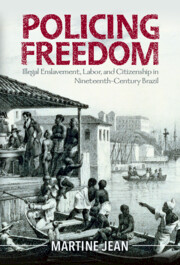‘Brazil has one of the highest prison populations in the world -it comes third, after the US and China. Adopting a micro-global approach, Policing Freedom masterfully connects the history of prisons with the crisis of slavery and the transformations in labor regimes in the Atlantic world during the nineteenth century.’
Sidney Chalhoub - Harvard University
‘In this tenaciously researched and haunting study of ‘slavery’s afterlives in punishment,’ Martine Jean tells the stories of those confined in Rio de Janeiro’s first modern-style penitentiary. Rio’s Casa de Correção was an urban construction site, a social experiment, a warehouse of people, and ultimately, Jean shows, a crucible for post-abolition society.’
Amy Chazkel - Columbia University
‘This book is an invaluable contribution to the study of police and political control of the popular classes, mainly but not only Africans and Afrodescendants, in the largest slaving city of the Atlantic basin, Rio de Janeiro. It combines with originality a discussion of the end of the transatlantic slave trade, the decline of slavery, and the formation of an immense, modern prison complex aimed at maintaining seignorial dominion.’
João José Reis - Universidade Federal da Bahia
‘This book offers a thought-provoking meditation on the continual reinvention of unfreedom, with chilling reverberations for today. … Recommended.’
B. A. Lucero
Source: Choice
‘A meticulous study of a nineteenth-century history that continues to resonate strongly in the present. Jean’s work reflects both an enormous command of relevant secondary literature in English and Portuguese as well as a detailed understanding of the official records documenting the politics, policies, and objectives that shaped the Casa de Correção and Rio’s transition from home to the largest urban enslaved population in the Americas to a racialized republic.’
Christina Proenza-Coles
Source: H-Net
‘… the book is an essential read for scholars interested in the connection between punishment and work in the Brazilian legal experience of the 19th century …’
Marjorie Carvalho de Souza
Source: Rechtsgeschichte - Legal History


